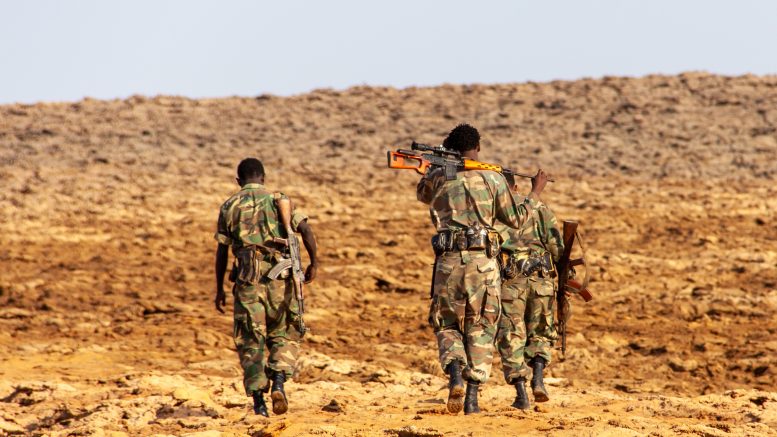In the last eighteen months there have been six coups in five countries in Sub-Saharan Africa — Burkina Faso, Chad, Guinea, Mali and Sudan. To get a grasp of what’s going on in that part of the world, I turned to the experts. “What all of us in the field are trying to understand is what the coup contagion actually means and what are the factors,” Clara Brackbill, a Sub-Saharan Africa analyst at risk intelligence company RANE, tells me in an interview. While each country is unique, she emphasizes, there are some common factors at play.
For a start, coups in this part of the world have been commonplace, she points out, noting that there have been nine attempted coups and four successful ones in Guinea alone since the country’s independence in 1974. Another is poor economic conditions and prospects, which in recent years have been exacerbated by the pandemic, and which have turned many citizens against their governments. A third is that in three of these countries — Burkina Faso, Mali and Chad — governments have failed to stop the violence from Islamist militants and armed rebels that have left so many people dead or displaced. A fourth is that there are few repercussions when the military does takes power. “There’s a history of coups, economic hardships, the fracturing of security forces, and, more recently, a low deterrent effect,” Brackbill says. “On top of that you have opportunistic military leaders, so it creates an environment that is really ripe for coups.”
Other factors, Brackbill and other experts agree, include endemic corruption and the embezzlement of public funds, weak democratic institutions, moves by elected officials to tamper with their country’s constitutions in order to extend their term limits, favouritism, and ethnic divisions.
Corinne Dufka, the West Africa director at Human Rights Watch, says she isn’t surprised by the number of coups. What’s clear, she says, is that challenging security situations undermine governance everywhere. “Islamists and military security force violence has killed thousands of people in recent years in the Sahel region and people are beside themselves with fear,” she says. “The number of dead and displaced is staggering so it makes sense that people are going to question why their governments have failed to protect them and their livelihoods and put their hopes in people who promise to do so.”
Anger over corruption — both within the security force establishment and amongst elected officials — has also fuelled discontent, particularly in Burkina Faso and Mali, Dufka says. “Allegations of misappropriation of funds that were supposed to support soldiers and their families have undermined confidence in those cases,” she says in a telephone interview from Washington, D.C. “I heard grievances in Burkina Faso that money was going missing, that soldiers were left in the field without being adequately provisioned or sent adequate means to defend themselves, and that wounded soldiers and their families were not being taken care of. In Mali you had a number of scandals involving military contracts, one that led to the suspension of funds from the World Bank and the IMF, and procurement scandals involving high-level officials.”
In terms of the ‘contagion element’ Dufka explains that some of the coup leaders know each other and may have been trained together. This, she argues, “creates a grievance template,” and can “inspire” other coups. “They just see that others have done it and so they can too.”
Democratic institutions were also typically weak, she says, and for things to change, democracy must extend beyond election day and be anchored on institutions that uphold it. “Just look at the role of Parliament. When there are allegations of corruption, parliamentary institutions should question the executive about what happened with the money. And that, or accountability for embezzlement, rarely if ever happens in these countries.”
Coup Chronology:
Burkina Faso: On January 24, President Roch Marc Christian Kabore was ousted by Lieutenant Colonel Paul-Henri Damiba. In his first national address Damiba said he would return the country to constitutional order “when the conditions are right.” The coup followed weeks of protests about Burkina Faso’s deteriorating security situation and poor economic conditions.
Sudan: In October 2021, General Abdel Fattah al-Burhan took control of Sudan, arresting Prime Minister Abdalla Hamdok, dissolving the Sovereignty Council, and declaring a state emergency.
Guinea: In September 2021, Colonel Mamady Doumbouya held President Alpha Conde in custody and reported on state television he was closing the borders and dissolving the government and the Constitution. According to media reports, Doumbouya said he was satisfying the will of the people and would root out poverty and corruption. “If the people are crushed by their elites, it is up to the army to give the people their freedom,” the colonel declared in his televised address. The overthrow followed Conde’s move to alter the Constitution to allow him to run for election a third time, beyond the two-term limit, and he won.
Chad: In April 2021, military generals in Chad announced that President Idriss Deby had been killed while visiting troops fighting rebels, and said he would be replaced by his son, Mohamat Idriss Deby, a four-star general. The maneuver violated the country’s Constitution, which says that if a president dies, the first vice president or president of the national assembly should assume power. Details about how the president was killed were also murky.
Mali: There have been two coups in the country in a nine-month period. The first, in August 2020, saw Colonel Assimi Goita depose Ibrahim Boubacar Keita, the country’s elected head of state. Goita became the transitional vice-president and agreed to an 18-month deadline for elections. The military installed as interim leaders, Bah Ndaw as president and Moctar Ouane as prime minister. But in May 2021, Goita took charge again, arresting the two men and accusing them of failing in their duties and sabotaging the transition.


Be the first to comment on "Understanding Africa’s coup epidemic"